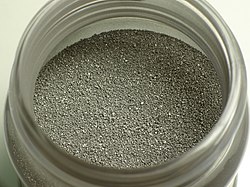Iron powder has several uses; for example production of magnetic alloys and certain types of steels.[1]

Iron powder is formed as a whole from several other iron particles. The particle sizes vary anywhere from 20-200 μm. The iron properties differ depending on the production method and history of a specific iron powder. There are three types of iron powder classifications: reduced iron powder, atomized powder,[2] and electrolytic iron powder. Each type is used in various applications depending on their properties. There is very little difference in the visual appearances of reduced iron powder and atomized iron powder.[3]
Applications
editAutomobiles
editMost iron powders are used for automobile parts.
Engine parts
edit- Cam shaft pulley
- Cam shaft sprocket
- Crank shaft pulley
- Crank shaft sprocket
- Cap crank bearing
- Valve guide
- Valve seat
- Rocker arm chip
- Oil pump inner rotor
- Oil pump outer rotor[4]
Steering parts, suspension, and brake parts
editSeats and door parts
editTransmission parts
edit- M/T Synchronizer hub
- A/T Hub clutch
- Synchronizer ring
- Retaining plate
- Synchronizer key
- Pressure plate
- Shift fork
- Turbine hub
- Weight governor
- Cam stater T. C.
- Outer race[4]
Other
editIron powder is also used for the following:
- Bearings and filter parts
- Machine parts
- Hand Warmers
- High strength/wear-resistant parts
- Magnetic materials
- Friction parts (mainly automobile parts)[4]
- As a method of hydrogen storage[5]
- As a fuel[6]
- Oxygen scavengers
External links
editWikimedia Commons has media related to Iron powder.
See also
editReferences
edit- ^ A.K. Gaiduchenko, S.G. Napara-Volgina (1995), "Development of iron powder metallurgy", Powder Metallurgy and Metal Ceramics, 34 (7–8): 424–428, doi:10.1007/BF00559435
- ^ By spraying high-pressure water against liquid iron.
- ^ "What is iron powder?". JFE Steel Corporation. Archived from the original on 24 April 2006. Retrieved 8 January 2014.
- ^ a b c d e "Applications of Iron Powder". JFE Steel Corporation. Archived from the original on 25 October 2006. Retrieved 8 January 2014.
- ^ Team SOLID
- ^ National Geographic Magazine, nr 12, 2018